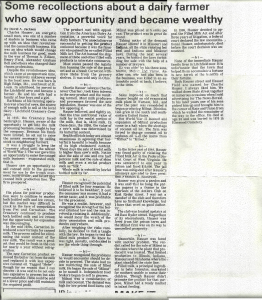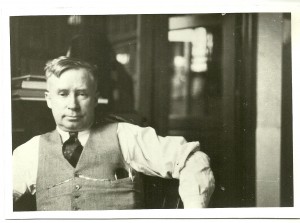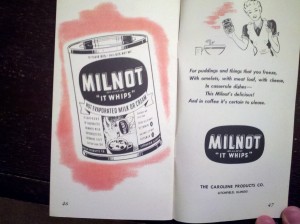This is the second part of my series of posts about Charles Hauser, the Defendant in United States v. Carolene Products. My first post looked at how a federal court struck down the Filled Milk Act in 1972, three decades after the Supreme Court famously upheld it. The second post looks at Hauser’s subsequent criminal conviction in 1943, which was affirmed by the Supreme Court. The third post analyzes the Milnot factory built that straddles the Missouri-Oklahoma border. The final post analyzes a subsequent pardon signed by President Roosevelt in in 1945.
After the Supreme Court upheld the constitutionality of the Filled Milk Act in United States v. Carolene Products in 1938, Charlie Houser, President of the Carolene Products Company, and producer of Milnot, was not quite ready to give up, and continued shipping filled milk across state lines.
According to this article from the Litchfield, Illinois, News Herald (4/30/2004), “After weighing the risks carefully, [Hauser] decided to risk a tangle with the law. He began to test the filled milk product. He knew he was right, morally, and decided to see things through.” Recognizing that Illinois did not have a Filled Milk law, he sold it to “independent food brokers” who sold it to grocers. Milnut was sold for 5 cents a can. Hauser, recognizing the demand, began to sell it in Missouri and Indiana, knowingly violating the federal law. Sales improved, and Hauser expanded distribution to the South and Southeastern United States.
 During World War II, a shortage of coconut oil caused the company to change its primary ingredient to soybean oil, and the name from Milnut to Milnot.
During World War II, a shortage of coconut oil caused the company to change its primary ingredient to soybean oil, and the name from Milnut to Milnot.
However, eventually the Feds caught up with him.
In 1941, Hauser and his associate William Hartke were indicted on 8 counts of shipping filled milk in federal court in West Virginia, where his product was imported across state lines.
The indictment is in eight counts, charging eight separate shipments of filled milk from Warsaw, Indiana, to Clarksburg, Parkersburg, Weston, Morgantown, and Moundsville, in the Northern District of West Virginia. All these shipments were made between February and July of the year 1941, and totalled 5,800 cases, of 48 cans to the case.
The facts, as stated by the district court, were not in dispute. Hauser argued that the Filled Milk Act did not apply to his product, and alternatively that the Filled Milk Act was unconstitutional. The Court, citing the Supreme Court’s opinion from only 5 years earlier, found that the Filled Milk Act does apply, and alternatively that it is constitutional.
The opinion seems to suggest that they were not involved in this particular transaction:
This brings us to the question of the guilt of the individual defendants, Charles Hauser and William H. Hartke. In the first place, it is admitted by the Government, at least in its brief, that there is no evidence to show that either of the individual defendants personally made or even had knowledge of the eight specific shipments complained of in this indictment.
…
The individual defendants say that they should be acquitted because there is no evidence that they made the shipments of “Carolene,” or that they had personal knowledge that the precise shipments, alleged in the indictment, into the Northern District of West Virginia, were to be made or were, in fact, made. As noted above, Hauser was President of Carolene Products Company, and Hartke was Vice President
From the Petitioner’s brief to the Supreme Court, it seems that Hauser an Hartke were each sentenced to “to imprisonment for one year, and placed on probation for an aggregate of two years after the expiration of their prison terms and each of the defendants was fined $1,000. on each of the eight counts in the indictment . . . The aggregate sentence of imprisonment against the individual defendants was one year under the first two counts, and six months on the third and fourth counts to run concurrently.”
The 4th Circuit affirmed, mostly restating the district court’s opinion. “We agree with these conclusions and we feel further that the discussion in the written opinion of the District Court encompasses every aspect of the case in so lucid a manner that it is not necessary for us to repeat what has there been said.” The Fourth Circuit did include an impressive string cites of other cases involving Carolene Products:
The problem of the sale of filled milk products has had the frequent consideration of several state legislatures as well as the attention of Congress. An impressive array of courts, state and federal, has refused to accept the very contentions now presented to us by the defendants. United States v. Carolene Products Co., 304 U.S. 144, 58 S.Ct. 778, 82 L.Ed. 1234; United States v. Carolene Products Co., 7 Cir., 104 F.2d 969; Hebe v. Shaw, 248 U.S. 297, 39 S.Ct. 125, 63 L.Ed. 255;Carolene Products Co. v. Evaporated Milk Ass’n, 7 Cir., 93 F.2d 202; Carolene Products Co. v. Wallace, D.C., 27 F.Supp. 110, affirmed 307 U.S. 612, 59 S.Ct. 1033, 83 L.Ed. 1495; Setzer v. Mayo, 150 Fla. 734, 9 So.2d 280; State of Kansas ex rel. Mitchell v. Sage Stores Co., 157 Kan. 404, 141 P.2d 655, decided by Kansas Supreme Court, October 2, 1943. Contra: Mahoney v. Carolene Products Co., 1 Cir., 2 F.2d 366.
This company was quite litigious.
The Supreme Court granted cert for that appeal, and Justice Reed wrote the opinion for the Court (and some guy named Tom Clark was on the briefs for the United States). The Court only considered a narrow question of whether the product was in fact banned by the Filled Milk Act, consistently with the 5th Amendment.
The limited writ of certiorari in this case was granted to review petitioners’ conviction, affirmed by the Circuit Court of Appeals, for a violation of the Filled Milk Act.[1] The Court was moved to allow the petition in order to examine the contentions that the accused articles of food cannot, under the due process clause of the Fifth Amendment to the Constitution, be banned from commerce when these compounds are nutritionally sufficient and not “in imitation or semblance” of milk or any milk product within the meaning of the statute and are not sold as milk or a milk product.
The Court upheld this challenge and affirmed the convictions of Hauser. Black and Douglas concurred without opinion. Amazingly, the case was argued on October 16, 1944, and decided on November 6, 1944. That is fast!
This portion from the Petitioner Brief is quite poignant:
If the judgment appealed from is permitted to stand, a great injustice will be done these defendants. Petitioners Hauser and Hartke have been branded as criminals and sentenced to substantial prison terms; all petitioners have been fined, and all because, forsooth, a highly nutritious product has been held to fall within the strict letter of a statute passed twenty years ago, when this product was unknown, to reach an entirely different, and deleterious, compound. . . . . It is unnecessary to discuss here whether or not, as certain members of Congress charged when the bill was under debate, the Filled Milk Act is legislation to protect not the public, but the profits of the dairy interests.*
However, Hauser never spent a year in jail, thanks to unlikely executive clemency from the President. In a future post, I will discuss the pardon Donna gave me. It seems that President Roosevelt also pardoned another famous defendant in a Supreme Court case.
As I discussed in my previous post, a federal district court ultimately struck down the law in 1972. Contrary to the statement in the article, Hauser died after the court’s ruling in in 1976 at the age of 94.

